|
|
|
Sort Order |
|
|
|
Items / Page
|
|
|
|
|
|
|
| Srl | Item |
| 1 |
ID:
130241
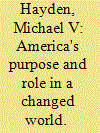

|
|
|
|
|
| Publication |
2014.
|
| Summary/Abstract |
I had never been a big fan of American exceptionalism. It was too self-referential, self-identifying, self-focused for my personal comfort. Then one bitterly cold day in February 1994, I was wandering through the open-air market in Sarajevo. The market had been hit by a single mortar round the previous weekend and sixty-eight people had been killed. Holes made by fragments from the 120-mm shell were still visible in the asphalt.
As I stared at the gouged surface in my battle dress and parka, Sarajevans began to come up to me, point to the small American flag on my upper sleeve, give a hesitant thumbs-up gesture, and whisper, almost prayerfully, "USA, USA."
Edward Snowden's leaks have fixated the media and the public on privacy and espionage, but the larger and more complex debate on protecting American security in the 21st century has been wanting.
At that point it became clear to me that it mattered less whether I thought America was exceptional. What mattered was that many people around the world thought that we were, and expected us to act accordingly. In many ways this is less something we have earned or even want, and more the product of historical circumstance. But a burden has clearly been ours, and when it is no longer ours the best judgment we can hope for is something along the lines of "As global hegemons go, these guys weren't bad." Now, under President Obama, the United States is involved in a redefinition or at least a recalibration of that exceptional role.
|
|
|
|
|
|
|
|
|
|
|
|
|
|
|
|
| 2 |
ID:
128738
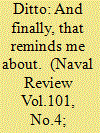

|
|
|
|
|
| Publication |
2013.
|
| Summary/Abstract |
Since I now live in the Gulf, it was a happy coincidence that found me in Portsmouth on 16th July 2013 and therefore able to attend the Centenary Party; and what a splendid affairs it was. I must have taken much work to prepare and I'm sure members will join me in thanking everyone involved.
|
|
|
|
|
|
|
|
|
|
|
|
|
|
|
|
| 3 |
ID:
128998
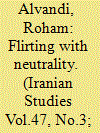

|
|
|
|
|
| Publication |
2014.
|
| Summary/Abstract |
Despite the Eisenhower administration's strong support for the Pahlavi monarchy, tensions simmered under the surface of Mohammad Reza Shah's relationship with the United States throughout the 1950s. Following the Qarani coup attempt and the overthrow of the Iraqi monarchy in 1958, the shah sought to diminish the Soviet threat to his regime and reduce his dependence on the United States by exploring Moscow's offer of a non-aggression treaty. Drawing on American, British, and Iranian sources, this article provides the first detailed history of these secret Soviet-Iranian negotiations that ended in disastrous failure for the shah in February 1959.
|
|
|
|
|
|
|
|
|
|
|
|
|
|
|
|
| 4 |
ID:
128995
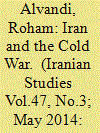

|
|
|
|
|
| Publication |
2014.
|
| Summary/Abstract |
For five decades, fromthe 1940s to the 1980s, Iran lived in the shadow of the Cold War between the United States and the Soviet Union. The country's geography, bordering both the USSR and the oil-rich Persian Gulf, meant that its territory and natural resources were of vital strategic importance in the ideological and material contest between the two superpowers, a global struggle over nothing less than "the soul of mankind."1 With the passage of nearly seventy years since the first Soviet-American confrontation in northern Iran, a growing number of scholars are examining the history of Iran's ColdWar, especially during the reign of Mohammad Reza Shah Pahlavi. Building on the work of earlier diplomatic historians, this emerging historiography looks both inward, at the impact of the Cold War on Iran, and outward, at the role of Iran in the Cold War far beyond its borders.2 This special issue showcases examples of this recent work by historians of Iran's Cold War, some of which was presented at the 2012 biannual conference of the International Society for Iranian Studies in Istanbul. Iran's importance in the Cold War is reflected in the rich literature on Iran's international history during the late Pahlavi period. The 1946 Iranian crisis marked the beginning of Iran's Cold War and the origins of the alliance between the United States and Iran, which continued until the fall of Mohammad Reza Shah in 1979.
|
|
|
|
|
|
|
|
|
|
|
|
|
|
|
|
| 5 |
ID:
133375
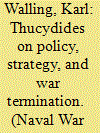

|
|
|
|
|
| Publication |
2014.
|
| Summary/Abstract |
The article discusses the works of Greek historian Thucydides on the topics of government policy during war, military strategy, and peacemaking and the termination of war. The article discusses the Peace of Nicias often associated with the conclusion of the first Peloponnesian War and why Thucydides did not believe that the treaty brought the war to an end. It discusses Thucydides's work "Pentecontaetia," tensions between city-states Athens and Sparta, and the Persian Wars.
|
|
|
|
|
|
|
|
|
|
|
|
|
|
|
|
| 6 |
ID:
125210
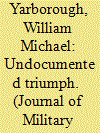

|
|
|
|
|
| Publication |
2013.
|
| Summary/Abstract |
the incomplete nature of operational records generated during and pre served after the Persian Gulf war (1990-91) has and will continue to challenge historians', medical researchers and veterans' understanding of the conflict. The war exposed the deterioration of the US Army's records management and the disestablishment of The Adjutant General's Office - TAGO in 1986. TAGO had overseen army records management, holding commanders accountable for their units records and using trained personnel to manage records within units. Focusing on operational records, this paper explores the breakdown of records management during the Gulf war, discussed the presidentially mandate Gulf war declassification project (1995-96) and briefly reviews current army operational records management.
|
|
|
|
|
|
|
|
|
|
|
|
|
|
|
|
| 7 |
ID:
144716
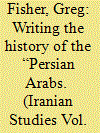

|
|
|
|
|
| Summary/Abstract |
Modern scholarship on Arabs in the pre-Islamic period has focused on Rome's Arab allies—the so-called “Jafnids” or “Ghassānids,” with much less attention paid to Persia's Arab allies, the so-called “Naṣrid” or “Lakhmid” dynasty of Arab leaders at al-Ḥīrah in Iraq. This article examines select pre-Islamic sources for the Persian Arabs, showing that even with the meager evidence available to us, and the lack of archaeological material, it is possible to draw a relatively complex portrait of the Persian Arabs. This article situates the Persian Arabs as important figures in some key themes and phenomena of late antiquity, such as the growth of Christian communities, the conflict between Rome and Persia, and the struggle for influence in the Arabian peninsula.
|
|
|
|
|
|
|
|
|
|
|
|
|
|
|
|
|
|
|
|
|